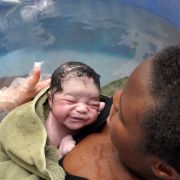Crowned With Good Midwifery Care
Fact or Fiction?
Debunking Common Myths About Home Birth and Midwives
When families begin exploring the option of home birth, they often encounter a flood of opinions—and unfortunately, plenty of misinformation. As a midwife, I’ve heard many of the same myths repeated over the years, and I’ve seen how those false ideas can create fear or hesitation around what can be a safe and beautiful way to welcome a baby.
Let’s take a closer look at some of these common myths—and the truth that sets the record straight.
Myth #1: Home Birth Midwives Aren’t Properly Trained
This is perhaps the most common misunderstanding. In truth, Certified Professional Midwives (CPMs) are specifically trained to attend out-of-hospital births. We receive extensive education in prenatal care, labor, birth, postpartum, and newborn support. We're also trained to recognize when something is no longer normal—and to act accordingly.
Unlike hospital providers who may only be present for a few minutes of your labor, home birth midwives provide continuous, hands-on care. We stay with you through the journey, offering support, wisdom, and gentle guidance.
Myth #2: Home Birth Midwives Can’t Handle Emergencies
While we certainly hope for a smooth birth, midwives are trained and equipped to respond quickly if complications arise. We come with oxygen, medications, tools for postpartum hemorrhage, and neonatal resuscitation supplies.
We maintain certifications in emergency care for both moms and babies and regularly refresh our skills through continuing education and peer review. And if a transfer becomes necessary, we facilitate that with calm, clear communication—always with your safety in mind.
Myth #3: Home Birth Means No Medical Tools or Monitoring
Home birth doesn’t mean “no tools”—it means appropriate use of tools when needed, and only when needed. We monitor vitals, listen to the baby’s heartbeat, assess labor progress, and carry medications when necessary.
But what we don’t do is intervene unnecessarily. The goal is to support your body’s natural design while protecting your autonomy. It’s not “doing nothing”—it’s doing what’s truly needed, no more and no less.
Myth #4: Only ‘Perfect’ Pregnancies Can Qualify for Home Birth
Home birth midwives do serve low-risk pregnancies—but what qualifies as “low-risk” is more flexible than some assume. Each mother is assessed individually, and risk is often influenced by nutrition, lifestyle, and support.
A mom in her late 30s with excellent health may be a better candidate than a 25-year-old with unmanaged health issues. We consult with physicians when needed and adjust plans with wisdom and collaboration—not fear.
Myth #5: Midwives Don’t Offer Full Care Before and After Birth
Home birth midwives offer comprehensive care that begins long before labor starts and continues well into the postpartum weeks. Prenatal visits are typically longer and more personal than traditional appointments, with plenty of space for questions, education, and emotional support.
After the birth, we stay to help with initial newborn care, breastfeeding, and recovery. And we follow up with several postpartum visits to ensure both you and your baby are thriving. You're not just a patient—we truly know you, and we walk with you through this sacred season.
Myth #6: There Are No Pain Relief Options at Home
While epidurals aren’t available at home, there are many ways to cope with labor naturally. Warm water, massage, counter-pressure, focused breathing, position changes, and loving encouragement all go a long way. Pain is a real part of labor—but so is strength. When you are supported, seen, and safe, pain often becomes purposeful.
Occasionally, a mom may choose to transfer for medical pain relief, and that’s okay. The point is not to “go without” but to make informed, prayerful decisions that reflect your values and needs.
The Heart of Midwifery
Midwives who attend home births are not reckless or outdated—we are deeply committed to providing excellent, evidence-based, and Spirit-led care. Our goal is not only to help you birth safely but to do so with peace, dignity, and joy.
We believe that birth is more than a medical event—it is a sacred moment, a powerful testimony, and a journey where God’s presence is near.
"For God has not given us a spirit of fear, but of power and of love and of a sound mind." – 2 Timothy 1:7
By setting aside fear and embracing truth, you open yourself to the possibility of a birth that is not only safe but beautifully personal and deeply empowering.
If you’re considering home birth, I’d love to talk more about what that could look like for your family.

Is a Home Birth right for you?
One of the main reasons people have traditionally chosen to give birth in hospitals—or haven’t questioned it—is the belief that hospitals are inherently safer. And for a time, that was true. However, today’s mothers are generally healthier, receive more comprehensive prenatal care, and benefit from higher living standards. On top of that, advancements in medical technology have transformed maternity care.
All of these factors have contributed to making planned home births just as safe—if not safer—for healthy women as hospital births. This has been consistently demonstrated by numerous studies conducted worldwide. More

When families begin exploring the option of home birth, they often encounter a flood of opinions—and unfortunately, plenty of misinformation. As a midwife, I’ve heard many of the same myths repeated over the years, and I’ve seen how those false ideas can create fear or hesitation around what can be a safe and beautiful way to welcome a baby.
Let’s take a closer look at some of these common myths—and the truth that sets the record straight.
Questions? Want to schedule an interview?
Feel free to call
417-321-9035
or click below and fill out a form to get more info.
© Crowned With Good Midwifery